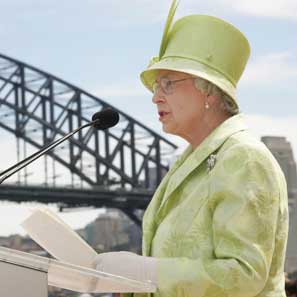Nation of riches is a poor performerAuthor: RICHARD McENCROEDate: 28/03/2006 Source: AGE |
 |
Australia's economic success is not being shared by its indigenous people and their Queen is willing to say so, writes Richard McEncroe. THE Queen clearly had more on her agenda than ceremonial duties when she arrived in Australia for the Commonwealth Games. She wanted to tell Australians that the situation in which indigenous Australians find themselves is not good enough, and she wanted to tell us in front of those responsible for making it better.In a speech to a dinner held in her honour at Parliament House, the Queen was clearly impressed with the contribution Australia has made to the region and the world, recognising our generosity to our regional neighbours in times of crisis. Less comforting for all Australians was the subtle regal rebuke she gave, reminding us that the prosperity and wealth is not being shared by all Australians, in particular indigenous Australians, noting that "for many indigenous Australians there remains much to be done". Like a chief executive addressing the assembled staff at Christmas time, or a school principal her departing charges at a valedictory dinner, the Queen acknowledged effort and success, but was clear that more is needed if true progress and maturity is to be claimed. Perhaps the Queen knows that Australia's successes in terms of economy and international contribution risk being viewed as facile unless and until the very real, very quiet and worsening humanitarian disaster that continues in our backyard is dealt with. The Queen is absolutely right to make this point. Perhaps she has read the Productivity Commission's most recent report on indigenous disadvantage, which makes it plain that the social and economic circumstances of indigenous people living in remote communities is intolerable in a developed country. Maybe the findings of this and other recent studies have been read more carefully and understood more fully in Buckingham Palace than they have at Kirribilli House. The Queen did not expand on her remarks, so we don't know if any particular aspect of the indigenous crisis prompted her to speak out. It may have been the fact that Australian society is creating a generation of indigenous Australians so poorly educated and trained that real economic participation is virtually impossible (40 per cent of indigenous people in remote communities have primary level schooling or less). Maybe the 60 per cent of indigenous people in remote communities that live in squalid, overcrowded conditions, with 20 or more people sharing one toilet house not uncommon, caught her attention. Or was it reports of teenage petrol sniffers committing suicide, horrifying rates of imprisonment, or family violence and dysfunction on a calamitous scale? Possibly, but a more likely explanation for the Queen choosing to use her visit to the Games, a celebration of health and wealth, to remind Australia's leaders that more needs doing, is that the crisis is occurring at the very time Australia is wealthy enough to tackle it. Australia's economy has been going gang busters for about a decade. The nation has a budget surplus of about $14 billion. It is morally repugnant for a nation of such wealth to allow such disadvantage to flourish. One got the sense, listening to her address, that the Queen knows that. Perhaps the Queen also knows that the international community, including Australia's present and potential trading partners, also recognise this inherent injustice and that, in turn, means a lot for the credibility of a nation seeking to take a lead in setting the moral and economic world order. One can only hope that those we elected to lead us listen to the unelected voice of leadership on this occasion. If reactions to the Queen's visit so far are any guide, however, the message may have been lost in translation. In the same week as the Queen made her remarks, federal Health Minister and committed monarchist Tony Abbott compared the problem of petrol sniffing to playing with matches, recommending that parents simply remove the matches. I don't think that sort of thinking is what the Queen had in mind by suggesting more needs to be done.Unfortunately for our democracy, and for the indigenous communities themselves, Kim Beazley seemed unfazed by the Queen's message. Having listened politely to the Queen, her Leader of the Opposition failed to seize the moment on behalf of the disadvantaged (I mean, why would he, he's only the leader of the Labor party), commenting on her diction; the Queen's English apparently making a bigger impression on him than the content of her speech. Those protesting on behalf of the indigenous communities also seemed to miss the point, directing their protests at the Queen, despite the fact that she seems to get it already. On this issue, the protesters and the Queen may be more closely aligned than either realise.Both recognise the need for more to be done and are trying to get the message out there. Much has been written in the past weeks about the leadership, personal integrity and good judgement of the Queen, so much so that the very survival of the monarchy beyond her tenure has been questioned. Much has also been made of the Prime Minister's respect for Her Majesty. For the sake of the tens of thousands of Australian kids living in squalor in remote Australian indigenous communities, let's hope that the Prime Minister's loyal devotion translates into a genuine effort on the part of the Government to "doing more for indigenous Australians".Richard McEncroe was a senior economist with the state Department of Treasury and Finance. |
|
|